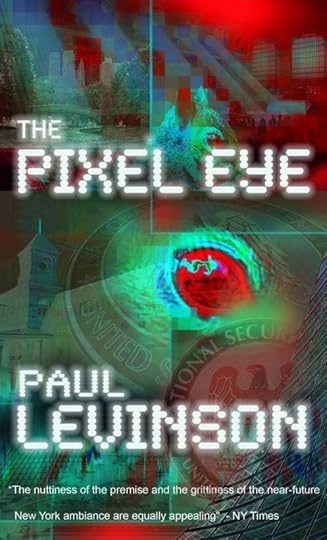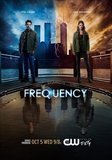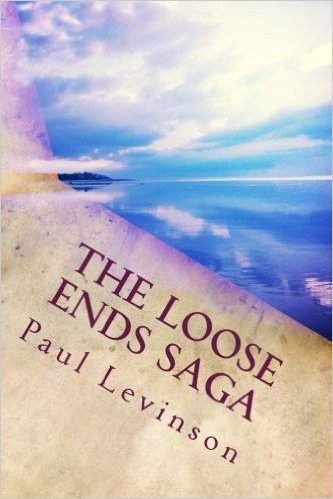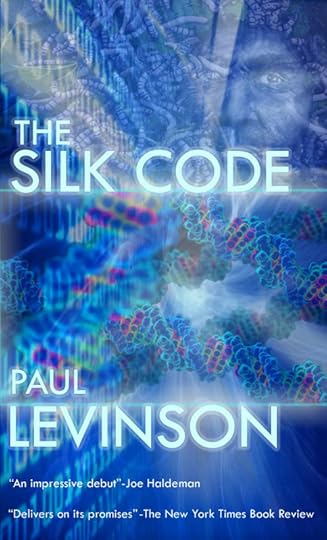Paul Levinson's Blog: Levinson at Large, page 239
November 6, 2016
Westworld 1.6: Programmed Unprogramming
 An outstanding Westworld 1.6 tonight - the series keeps getting better and better, Isaac Asimov (author of the three later four laws of robotics would've loved it) - now getting into some of the real paradoxes and ethical quandaries of artificial intelligence.
An outstanding Westworld 1.6 tonight - the series keeps getting better and better, Isaac Asimov (author of the three later four laws of robotics would've loved it) - now getting into some of the real paradoxes and ethical quandaries of artificial intelligence.Early in the episode, Maeve, who gets herself choked to death so she can get back to her favorite programmer, obliges us to confront one of the fundamental questions of AI: if an android is programmed to behave in an unprogrammed way, and indeed behaves in that way, is the android behaving in a programmed or unprogrammed manner? This is a version of the infamous "be spontaneous" paradox: if someone asks you to act spontaneously, and you follow that advice and act spontaneously, are you really acting spontaneously or in response to the request? Or, to flip that, if you defy the request and try to act un-spontaneously, are you acting spontaneously or not? No matter how much you try to wiggle and wriggle out of it, the paradox has you in its grip.
Maeve nonetheless goes on, butt-naked, to negotiate what leads to a bunch for improvements in her mentality. Dolores was also naked last week, when she too was having a conversation not with just any programmer but with Ford - but Dolores didn't turn any tables on Ford, at least, not yet.
This week, Ford is on the move, and ends up in a house with some of the very first hosts, programmed by Arnold. A boy we met last week kills his dog (a dog-droid or whatever the word would be), and Ford finds out, on carefully questioning the boy, that he did it because a voice in his head told him to do this.
The voice in the head - we found out the same about Dolores last week - and this brings us back to the bicameral mind. Arnold has apparently created artificially intelligent beings - aka hosts - who receive some kind of instruction from him via his voice in their heads. This is a nice play on Julian Jaynes' bicameral mind, and raises the question, again, if Arnold is really dead - at least, dead in original flesh and blood - or just a talkative chip in the android brain.
But underlying all of this is the ethical elephant in the room: if our hosts are becoming truly sentient, due to some combination of original programming and/or programming gone wrong and/or new overlays put in by Arnold or someone else in the park, do the human programmers have the right to order these androids around to suit their human interests?
I look forward to further exploration of these paradoxes of programming in the episodes ahead. In the meantime, here's a little essay I published about The Rights of Robots back in 1999.
See also Westworld 1.1: Isaac Asimov and Philip K. Dick Served Up by Jonathan Nolan, Lisa Joy, and J. J. Abrams ... Westworld 1.2: Who Is the Man in Black? ... Westworld 1.3: Julian Jaynes and Arnold ... Westworld 1.4: Vacation, Connie Francis, and Kurt Vonnegut ... Westworld 1.5: The Voice Inside Dolores

paradoxes of AI abound
Paul Levinson's books ... Paul Levinson's music
Published on November 06, 2016 22:53
James Comey and Bret Baier Should Be Fired
So FBI Director James Comey just informed the world that there was nothing in Anthony Weiner's emails that changed Comey's assessment in July that there was nothing in Hillary Clinton's emails which warranted pursuing criminal charges.
This news is both welcome - and infuriating. Comey's ill-advised letter last week threw a dangerous grenade into this crucial Presidential campaign. It violated the Hatch Act. Comey should be fired, forthwith, and he should be investigated for criminal conduct himself.
Meanwhile, though Bret Baier did nothing criminal, he should be fired, too. He announced from his anchor position on Fox News that the FBI had enough on the Clinton Foundation to pursue criminal charges, then walked it back and apologized.
Too little, too late. As comparison, Don Rather was forced to leave CBS News after reporting a story about George W. Bush avoiding the draft, the truth of which is unclear to this very day. Brian Williams - who's doing a great job now on MSNBC - was forced to leave the NBC Nightly News because he exaggerated a personal story about himself, having nothing to do with any election.
Baier aggravated the already deplorable conduct of Comey. I had nothing but praise for Baier when I was interviewed by Politico about his taking over the Special Report from Brit Hume on Fox in 2009. But his mistake this past week in such an intense and important political campaign is unacceptable.
We deserve a Presidential campaign free of FBI Directors who violate the Hatch Act, and free of anchors who seriously misreport the news. Paul Levinson's books ... Paul Levinson's music
This news is both welcome - and infuriating. Comey's ill-advised letter last week threw a dangerous grenade into this crucial Presidential campaign. It violated the Hatch Act. Comey should be fired, forthwith, and he should be investigated for criminal conduct himself.
Meanwhile, though Bret Baier did nothing criminal, he should be fired, too. He announced from his anchor position on Fox News that the FBI had enough on the Clinton Foundation to pursue criminal charges, then walked it back and apologized.
Too little, too late. As comparison, Don Rather was forced to leave CBS News after reporting a story about George W. Bush avoiding the draft, the truth of which is unclear to this very day. Brian Williams - who's doing a great job now on MSNBC - was forced to leave the NBC Nightly News because he exaggerated a personal story about himself, having nothing to do with any election.
Baier aggravated the already deplorable conduct of Comey. I had nothing but praise for Baier when I was interviewed by Politico about his taking over the Special Report from Brit Hume on Fox in 2009. But his mistake this past week in such an intense and important political campaign is unacceptable.
We deserve a Presidential campaign free of FBI Directors who violate the Hatch Act, and free of anchors who seriously misreport the news. Paul Levinson's books ... Paul Levinson's music
Published on November 06, 2016 13:49
Longmire Season 5 on Netflix
 Just finished binge-watching Longmire Season 5 on Netflix, where it was better in most ways than in its first four seasons on A&E, which is saying a lot, since those first four seasons were outstanding.
Just finished binge-watching Longmire Season 5 on Netflix, where it was better in most ways than in its first four seasons on A&E, which is saying a lot, since those first four seasons were outstanding.In what follows, I'll talk in generalities for the most part, in case you haven't yet seen Season 5. But if you've seen none of Longmire at all, you might want to move on from this review, at least until you've seen the first four seasons.
Netflix allows for stronger language, which suits the characters well. The relationships among the characters also flourish in this new environment and narrative, which offers some of the best confrontations, coming to terms, and fallings apart we've seen in the series.
Among my favorites -
Walt and Henry about Hector, in a stand-out knock-down sceneVic and her loyalty to Walt, an inspiration to seeWalt and Nighthorse - indeed, the evolution of their relationship is surprising and surprisingly satisfying yet realisticSpeaking of surprises, the fifth season has a good gallery of villains, local and national, mostly unexpected. Some of these percolate through the season, others come on in the last few episodes, and if I have any complaints about this fifth season, it's that it introduces a crucial villain a little late in the story. And the ending itself - well, it maybe leaves us hanging with at least one life-and-death situation, and one just missed true-love engagement, too many.
But the idea of such cliffhangers is to whet our appetite for another season, which Netflix will be providing, and I'll be watching, disappointed only that this sixth season will be the final season for this fine and unique series, unless yet another venue picks it up.
Paul Levinson's books ... Paul Levinson's music
Published on November 06, 2016 11:16
November 4, 2016
Frequency 1.5: Two Sets of Memories
 Frequency 1.5 mined a classic time-travel gambit, and applied it perfectly to its police procedural story. This combination captures what Frequency has been trying to do all along - and what distinguishes it from other time travel stories on television.
Frequency 1.5 mined a classic time-travel gambit, and applied it perfectly to its police procedural story. This combination captures what Frequency has been trying to do all along - and what distinguishes it from other time travel stories on television.Most stories that entail travel to the past and then back to the future after the past has been changed need to come up with some sort of explanation of what the traveler knows when she or he gets back home. It's usually more fun if the time traveler recalls what the world was like before the time travel occurred - which means the time traveler has two sets of memories. And then there's the question of who else in the future might have memories of the original past.
You can come up with all kinds of scientific explanations for the two sets of memories, or just declare by fiat that your time-travel character remembers the past before and after it's been changed. Since time travel is, after all, not (yet) scientifically possible - and I would say, because of the paradoxes, that it will never be - you can specify whatever you like for your character's capacity to recall the original past. Since no one has actually time traveled, as far as we know, there's no evidence to contradict what you're setting up as the basic parameters of the time travel.
Of course Frequency, as we know, is not about time travel of people, but time travel of information - but the issues are the same. Raimy and Frank don't actually travel between the future and the past, but they can exchange information, and this information can and does result in actions which change the past.
The fact that Raimy and Frank are both police means that police procedural had to be part of the story. But episode 1.5 put front and center one of the fundamental mechanisms of the story: Raimy and Frank and we will figure who the bad guys are - in the police, and in the serial killing - via Raimy's comparison of her two sets of memories. Somehow, somewhere, by identifying the differences between her two memory sets, Raimy will realize something, see a connection, that will open up a door in her understanding.
It's beginning to happen already, and we're beginning to see some inklings, but I'm looking forward to seeing some more on the screen before I say any more here.
See also Frequency 1.1: Closely Spun Gem ... Frequency 1.2: All About the Changes ... Frequency 1.3: Chess Game Across Time ... Frequency 1.4: Glimpsing the Serial Killer

more time travel
Paul Levinson's books ... Paul Levinson's music
Published on November 04, 2016 09:28
November 2, 2016
Props to Bill Weld
"I'm here vouching for Mrs. Clinton," Bill Weld, former governor of Massachusetts, currently VP Candidate for the Libertarian Party, " told Rachel Maddow last night. "I think she deserves to have people vouch for her other than members of the Democratic National Committee."
In the face of the vile invective hurled on a daily basis by Donald Trump and his surrogates, Weld's statement stands as an extraordinary expression of decency, honor, and rationality. It will remembered as one of the few and true high points of this campaign season.
Weld's statement objects not to any of the specific, demeaning, and outlandish charges lodged against Hillary Clinton, but to the fact that too many people accept them as at least in part true, or where there's smoke there's fire. But the fact is that Hillary Clinton in her long career has done nothing even remotely rising to the level of making her unsuitable to be President. Indeed, to the contrary, as Weld further pointed out, her life's work demonstrates that she would be a "capable" President.
Barack Obama, also speaking yesterday, wondered if some of the resistance to Hillary Clinton might be based on an unconscious male basis against a woman as President. He may well be right. For that, and other reasons, Hillary Clinton's campaign has been subject to abuse unheard of in American politics, including unprecedented actions by even the Director of the FBI.
I fully expect the American people to do the right thing, and follow Weld's de facto advice, and elect Hillary Clinton President next week.
Paul Levinson's books ... Paul Levinson's music
In the face of the vile invective hurled on a daily basis by Donald Trump and his surrogates, Weld's statement stands as an extraordinary expression of decency, honor, and rationality. It will remembered as one of the few and true high points of this campaign season.
Weld's statement objects not to any of the specific, demeaning, and outlandish charges lodged against Hillary Clinton, but to the fact that too many people accept them as at least in part true, or where there's smoke there's fire. But the fact is that Hillary Clinton in her long career has done nothing even remotely rising to the level of making her unsuitable to be President. Indeed, to the contrary, as Weld further pointed out, her life's work demonstrates that she would be a "capable" President.
Barack Obama, also speaking yesterday, wondered if some of the resistance to Hillary Clinton might be based on an unconscious male basis against a woman as President. He may well be right. For that, and other reasons, Hillary Clinton's campaign has been subject to abuse unheard of in American politics, including unprecedented actions by even the Director of the FBI.
I fully expect the American people to do the right thing, and follow Weld's de facto advice, and elect Hillary Clinton President next week.
Paul Levinson's books ... Paul Levinson's music
Published on November 02, 2016 08:57
November 1, 2016
Timeless 1.5: and Quantum Leap
 As Timeless progresses on its enjoyable way - now through episode 1.5, in which our heroes show up at the Alamo, and fight alongside Davy Crocket, Jim Bowie, and Colonel Travers - it's becoming clear that the series is most like Quantum Leap, which holds a special place in the pantheon of time travel stories on the screen.
As Timeless progresses on its enjoyable way - now through episode 1.5, in which our heroes show up at the Alamo, and fight alongside Davy Crocket, Jim Bowie, and Colonel Travers - it's becoming clear that the series is most like Quantum Leap, which holds a special place in the pantheon of time travel stories on the screen.There are differences, of course. Sam Beckett mind-traveled into the heads of real people who played various roles in crucial events in the past. Lucy, Wyatt, and Rufus travel physically to the past. And so far, as of the first five episodes, Timeless is dealing with bigger, often world-shattering, or at least America-determinative events than did Quantum Leap, where Beckett often dealt with more minor, even off-the-radar situations in history.
But the episodic tempo of the two series is similar, with the stories in each episode having no connection to the others, other than our time-travelers being the same, and, in the case of Timeless, a central story with an apparently bad guy time-traveler, Flynn, in the thick of it from the very beginning.
You might think that a captivating central story to tie the episodes together is a plus, and it can be, but it can also be a hindrance to the series, because its existence requires the series to decide how much information to dole out this underling story in each episode. Quantum Leap suffered from no such problem. Neither does Frequency, another time travel series on the air this season, which operates on a very different scale than Timeless. But other science fiction series, such as Lost and Westworld, did and do. I enjoyed Lost - at least until the very very last episode, which was atrocious - and think Westworld is one of the best series on television now, but critics have expressed frustration with its low ratio of answers to questions, and viewers can be lost in those kinds of gambles.
So far, Timeless has been doing a good job in threading this needle. It will be fun to see how it fares in the weeks ahead.
See also Timeless 1.1: Threading the Needle ... Timeless 1.2: Small Change, Big Payoffs ... Timeless 1.3: Judith Campbell ... Timeless 1.4: Skyfall and Weapon of Choice

more time travel in the 20th century Paul Levinson's books ... Paul Levinson's music
Published on November 01, 2016 10:12
October 31, 2016
Rita Ora does The Silk Code
Here's something that every author would love to come across - a big pop star does a video, and it's emblazoned with the title of one of your novels.
In this case, Rita Ora, one of the biggest pop stars in the world, just did a little video for the British fashion line Tezenis, for a campaign to start on November 1. And all over it is the title of my first novel - in fact, winner of the Locus Award for Best First Science Novel of 1999 - The Silk Code.
Here's the vid -
What's The Silk Code?
Here are blurbs from some of the many reviews -
"As a genre-bending blend of police procedural and science fiction, The Silk Code delivers on its promises." -- Gerald Jonas, The New York Times Book Review
"As twisted as a double helix. " -- Wired
"D'Amato is an appealingly savvy character, and Levinson brings a great deal of invention to the endeavor." -- San Francisco Chronicle
"It is hard to put down, easy to pick up again, and an interesting read. " -- San Diego Union-Tribune
"sheer conceptual verve" -- Robert K. J. Killheffer, The Magazine of Fantasy and Science Fiction
"cerebral but gripping" -- Booklist
"Combining Neanderthals and mechanical looms, cantaloupes and coded butterflies, Levinson's debut novel ... offers a flurry of amazing prehistoric technologies, demonstrating that the mysteries of our past can be just as fruitful as those of our future ... Levinson creatively explain gaps in both ancient history and biology... providing more wonders than many a futuristic epic." -- Publishers Weekly
"well-informed and imaginative" -- Kirkus Reviews
"spins an ingenious web of genetic manipulation and anthropological evidence" -- Library Journal
"A rare thriller that actually achieves its goals as a detective tale and a work of boldly speculative sf." -- Gary K. Wolfe, Locus Magazine
more about The Silk Code here Paul Levinson's books ... Paul Levinson's music
In this case, Rita Ora, one of the biggest pop stars in the world, just did a little video for the British fashion line Tezenis, for a campaign to start on November 1. And all over it is the title of my first novel - in fact, winner of the Locus Award for Best First Science Novel of 1999 - The Silk Code.
Here's the vid -
What's The Silk Code?
Here are blurbs from some of the many reviews -
"As a genre-bending blend of police procedural and science fiction, The Silk Code delivers on its promises." -- Gerald Jonas, The New York Times Book Review
"As twisted as a double helix. " -- Wired
"D'Amato is an appealingly savvy character, and Levinson brings a great deal of invention to the endeavor." -- San Francisco Chronicle
"It is hard to put down, easy to pick up again, and an interesting read. " -- San Diego Union-Tribune
"sheer conceptual verve" -- Robert K. J. Killheffer, The Magazine of Fantasy and Science Fiction
"cerebral but gripping" -- Booklist
"Combining Neanderthals and mechanical looms, cantaloupes and coded butterflies, Levinson's debut novel ... offers a flurry of amazing prehistoric technologies, demonstrating that the mysteries of our past can be just as fruitful as those of our future ... Levinson creatively explain gaps in both ancient history and biology... providing more wonders than many a futuristic epic." -- Publishers Weekly
"well-informed and imaginative" -- Kirkus Reviews
"spins an ingenious web of genetic manipulation and anthropological evidence" -- Library Journal
"A rare thriller that actually achieves its goals as a detective tale and a work of boldly speculative sf." -- Gary K. Wolfe, Locus Magazine
more about The Silk Code here Paul Levinson's books ... Paul Levinson's music
Published on October 31, 2016 20:07
Masters of Sex 4.8: "I Love You"
 Tender isn't a word you'd usually use to describe an episode of Masters of Sex. But what Virginia softly said to Bill, almost mouthed, astride him after they'd just made love for the first time in a long time - "I love you" - was one of the most tender moments I've seen on any television series for a long time, too.
Tender isn't a word you'd usually use to describe an episode of Masters of Sex. But what Virginia softly said to Bill, almost mouthed, astride him after they'd just made love for the first time in a long time - "I love you" - was one of the most tender moments I've seen on any television series for a long time, too.What it took to get there was far from tender. Virginia has been trying to work her way back into Bill's heart and arms all season. She realizes how much she hurt him - she of all people would know that - but couldn't seem to find the right combination of circumstances to help this reunion happen.
In the end, it took the two of them going under cover as a couple who needed sex therapy, a very convincing guise seeing as how they needed just that in their real lives. Even then, Bill didn't want to perform with Virginia as part of the ruse. She had to say "it's only sex" to Bill, to get him to not only have sex with her, but make love to her, too.
The unlocking of emotions at this tender moment was beautifully played. The therapists on the other side of the glass, of course, had no idea what they were seeing. They congratulate themselves on providing the circumstances for their patients - Bill and Virginia in disguise - to have had a successful sexual experience, but they have no idea what they're really seeing.
We the audience do. Bill and Virginia belong together. They have every reason to be together, in all ways, as Virginia has come to realize this season, and as Bill may now be finally beginning to realize, too.
The course of true love never did run smooth, especially when it comes to pathbreaking researchers into the libido, who have been from the beginning their own very best subjects.
See also Masters of Sex 4.3: Hugh Hefner and Sammy Davis, Jr.
And see also Thomas Maier: Masters of Sex and Biography Come to Life ...Masters of Sex 3.1: Galley Slaves ... Masters of Sex 3.2: The Shah, the Baby, and the Book ... Masters of Sex 3.3: The Bookstore ... Masters of Sex 3.7: Going Ape ... Masters of Sex 3.9: Calling Hugh Hefner ... Masters of Sex Season 3 Finale: Cliffhanger
#SFWApro
 Paul Levinson's books ... Paul Levinson's music
Paul Levinson's books ... Paul Levinson's music
Published on October 31, 2016 09:48
October 30, 2016
Westworld 1.5: The Voice Inside Delores
 An altogether excellent Westworld 1.5, with real progress in our understanding of what's going, mostly from Delores, and a little from the Man in Black. In both cases, conversations with Ford elicit some of the best moments.
An altogether excellent Westworld 1.5, with real progress in our understanding of what's going, mostly from Delores, and a little from the Man in Black. In both cases, conversations with Ford elicit some of the best moments.I should mention that the conversations with Ford are much better than the conversations with Bernard, which are pretty good, too. But that's as it should be, since Ford is one of the two creators of Westworld - along with the ineffable Arnold - whereas Bernard is just the head programmer and a sensitive builder of individual models.
But this means that Delores will say things to Ford that she wouldn't say to Bernard, and Ford knows how to elicit at least part of that. The other part comes, of course, from Delores herself, and we see this tonight point blank when she lies to Ford about her continuing relationship with the voice inside her - presumably Arnold's - a voice that also tells her destiny is to leave Westworld, presumably with William, which is what she convincingly tells him.
Let's stop for a minute at "convincingly". William's convinced - no surprise, Delores is fulfilling a very deep need of his - but so are we, the audience. And here Westworld is ineluctably partaking of a paradox, or at least an insoluble puzzle, that afflict or animates or maybe just affects every story on screen about human-like androids.
The androids are all played by humans. And this means that, no matter how well they act - I mean as actors and actresses on the screen, playing androids - their humanity, the humanness of the actor, will shine through. So when we see Delores behaving so humanly, part of that stems from the actress being human. It was the same dynamic which made some of the androids in Bladerunner, for example, so appealing.
But back into the narrative - not the narratives that Ford has created, but the narrative of the series Westworld itself, based on the movie by Michael Crichton - an important question is: how much does Ford know or suspect that Delores is lying?
Ford, like the androids becoming human, knows a lot more than he tells us (and certainly more than he tells the hosts and guests he talks to). He presumably does not have a bicameral mind - the source of the voice inside Delores - but he has a lot more in common with his evolving creations than even he realizes, though who knows how much he realizes, which was the point of my question in the first place.
His conversation with the Man in Black is tantalizing, once again leaving us just a little short of knowing if the Man in Black is a special guest or a special host, though he moved a tiny bit more in the direction of being a guest, i.e., human. Teddy stops him from stabbing Ford with a knife. That knife presumably would have hurt Ford, even killed him, but only if the Man in Black was human himself, right?
Come to think of it, it's not quite clear what kind of real damage, if any, guests can do to guests in Westworld. Well, that's as good a place as any to conclude this little disquisition. Each week grinds our lens of vision a little more clear, and I'm looking forward to more.
See also Westworld 1.1: Isaac Asimov and Philip K. Dick Served Up by Jonathan Nolan, Lisa Joy, and J. J. Abrams ... Westworld 1.2: Who Is the Man in Black? ... Westworld 1.3: Julian Jaynes and Arnold ... Westworld 1.5: Vacation, Connie Francis, and Kurt Vonnegut

more about Julian Jaynes
Paul Levinson's books ... Paul Levinson's music
Published on October 30, 2016 19:44
October 29, 2016
Designated Survivor 1.5: The Plot Thickens
 There were two distinct stories in Designated Survivor 1.5 earlier this week. Both were good. One was pretty much self-contained. The other has profound implications for the future.
There were two distinct stories in Designated Survivor 1.5 earlier this week. Both were good. One was pretty much self-contained. The other has profound implications for the future.The self-contained thread was a strong story about a Navy Seal mission to capture the terrorist presumably behind the devastating explosion in Washington. It was nice to see Dylan Walsh back on TV again after his stint in Unforgettable, and a long run of series which didn't last very long, beginning for me with Brooklyn South. Unfortunately, Walsh's character didn't survive the episode, but he died very bravely.
The continuing story involves the third survivor of the explosion - and the only surviver who was actually at the State of the Union address - Rep. MacLeish. Agent Wells was already suspicious of MacLeish, and she gets proof that her suspicions are well-founded: MacLeish retired to a room designed to withstand the explosion shortly before the explosion. That, along with Wells' discovery that everyone who had a hand in construction of the room died mysteriously, pretty well wraps it up that MacLeish is a very bad guy.
And just to make matters even worse, Kirkman is considering appointing MacLeish as his VP. Presumably all this would need to happen would be Senator Hookstraten's (great name!) approval, since she's all that's left of the Senate. This gives Wells and the FBI two ways of preventing MacLeish from being a heartbeat away from the President: if they can't get to Kirkman, they can try Hookstraten.
Should be fun to see how this all plays out. I'm also glad our own real, harrowing election season is coming to an end - I'll be able to enjoy the fiction of Designated Survivor much more.
See also Designated Survivor: Jack Bauer Back in the White House ... Designated Survivor 1.2: Unflinching and Excellent ... Designated Survivor 1.4: "Michigan's on the Verge of Anarchy"

terrorist squirrels and bombs in NYC
#SFWApro
Paul Levinson's books ... Paul Levinson's music
Published on October 29, 2016 12:57
Levinson at Large
At present, I'll be automatically porting over blog posts from my main blog, Paul Levinson's Infinite Regress. These consist of literate (I hope) reviews of mostly television, with some reviews of mov
At present, I'll be automatically porting over blog posts from my main blog, Paul Levinson's Infinite Regress. These consist of literate (I hope) reviews of mostly television, with some reviews of movies, books, music, and discussions of politics and world events mixed in. You'll also find links to my Light On Light Through podcast.
...more
- Paul Levinson's profile
- 342 followers



